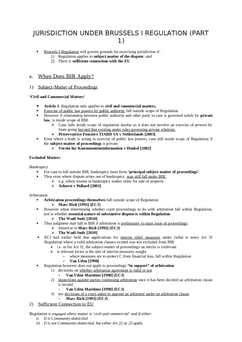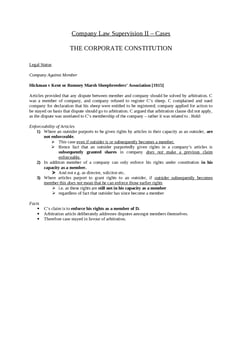Adams v Cape Industries Plc [1990] 2 WLR 657; [1990] Ch 433; [1991] 1 All ER 929
Judgement for the case Adams v Cape Industries Plc
Table Of Contents
KEY POINTS
Conflict of laws arises when legal disputes involve multiple jurisdictions with conflicting laws. Determining applicable laws involves considering factors like parties' locations and relevant agreements.
Enforcing foreign judgments requires understanding the legal systems of both issuing and enforcing countries, considering reciprocity, legal principles, and procedural requirements.
Jurisdiction to enforce refers to a court's authority to enforce its judgments. Enforcing judgments internationally involves assessing jurisdiction over parties and subjects and adherence to international law.
English companies mining asbestos in South Africa faced legal challenges including jurisdictional issues, environmental regulations, and corporate responsibility, subject to both English and South African laws.
FACTS
-
Cape, an English company, oversaw a group of subsidiaries that mined and marketed asbestos in South Africa until 1979.
N.A.A.C., Cape's wholly owned subsidiary in the USA, marketed asbestos and was involved in legal actions in Texas in 1974 (Tyler 1 actions) and 1978-1979 (Tyler 2 actions).
Tyler 1 actions settled in 1977 for $20m, with Cape and subsidiaries bearing over $5m.
Cape and Capasco contested jurisdiction but participated in the Tyler 1 actions settlement.
-
Tyler 2 actions ensued in 1978-1979; Cape and Capasco denied jurisdiction and let default judgments be entered against them.
N.A.A.C. ceased business in 1978; Cape formed new entities, C.P.C. and A.M.C., for continued marketing.
Tyler 2 (“Plaintiffs”) settled with the US (“Defendants”), excluding the government, in 1983.
A default judgment for over $154m was entered against Cape and Capasco on September 12, 1983, without a judicial hearing.
The Plaintiffs sought to enforce the default judgment against Cape and Capasco in England.
-
Scott J. dismissed the actions, ruling that submission to Tyler 1 jurisdiction didn't extend to Tyler 2 and that Cape / Capasco had not consented to Tyler 2 jurisdiction.
Scott J. also found that the default judgment procedure violated principles of natural justice and lacked judicial assessment of liability and evidence-based damages assessment.
JUDGEMENT
-
The court determined that overseas trading corporations were only considered present in another country's jurisdiction if they had established a fixed place of business there and conducted business for a significant period.
They found that C.P.C. was independently owned, and Cape's actions were lawful attempts to reduce its appearance of involvement in the United States.
-
The Plaintiff's burden fell on the court to demonstrate the competence of the foreign court.
The court also concluded that the method used by the Tyler court to determine the default judgment amount did not meet the requirements of justice.
The Defendants' failure to challenge the default judgment did not prevent them from relying on the breach of natural justice as a defense.
COMMENTARY
-
This case involves legal complexities surrounding conflict of laws, enforcement of foreign judgments, and jurisdictional disputes.
Cape, an English company overseeing asbestos mining in South Africa, faced legal challenges in the USA, leading to settlements and default judgments.
Despite contesting jurisdiction, Cape's subsidiaries were involved in legal actions.
The court dismissed attempts to enforce the default judgment in England, ruling that submission to one jurisdiction didn't extend to another.
It also criticized the default judgment procedure for lacking fairness. The case highlights the challenges of navigating international legal disputes and underscores the importance of adhering to jurisdiction and procedural justice principles.
For Further Study on Adams v Cape Industries Plc

Conflict of Laws notes fully updated for recent exams in the UK. The...
Need instant answers? Our AI exam tutor is here to help.
Ask questions 🙋 Get answers 📔 It's simple 👁️👄👁️
Our AI is educated by the highest scoring students across all subjects and schools. Join hundreds of your peers today.
Get StartedSimilar Cases
Related Product Samples
These product samples contain the same concepts we cover in this case.


